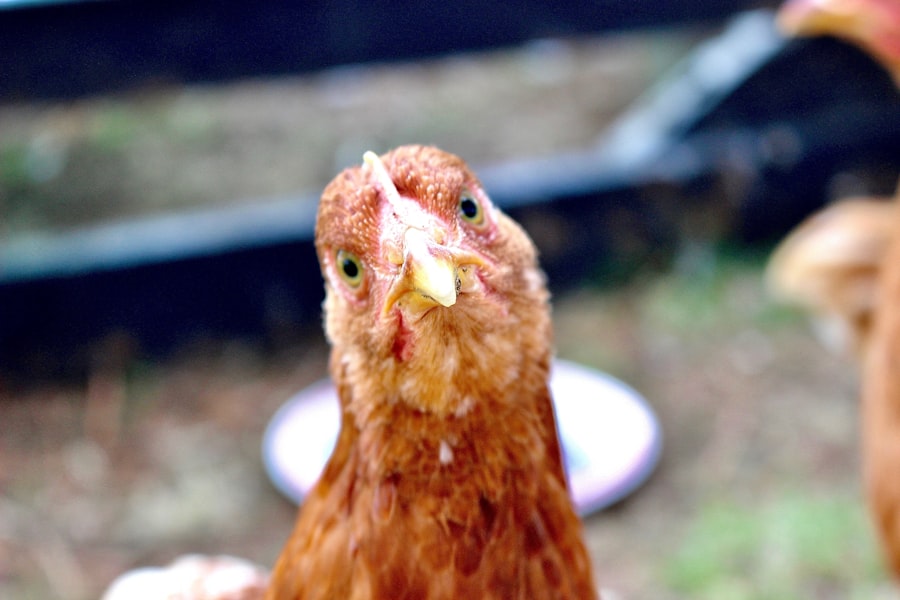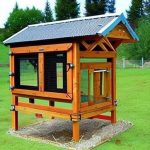Keeping chickens has become increasingly popular in recent years, and for good reason. Not only do chickens provide a sustainable source of fresh eggs, but they also offer a range of other benefits. They can help control pests in your garden, provide natural fertilizer for your plants, and even serve as friendly and entertaining pets. Personally, I have found keeping chickens to be a rewarding and enjoyable experience. Not only do I get to enjoy the delicious taste of fresh eggs every morning, but I also find great joy in watching my chickens roam around the yard and interact with each other.
Key Takeaways
- Keeping chickens can be a rewarding hobby and a source of fresh eggs.
- Bylaws are important for keeping chickens to ensure the safety and well-being of both the chickens and the community.
- It is important to understand local regulations and zoning requirements for chicken coops before starting to keep chickens.
- Minimum standards for chicken coops and rules for fencing and enclosures should be followed to ensure the health and safety of the chickens.
- Chicken owners have responsibilities to maintain the health and safety of their chickens and to control noise and odor. Violating chicken bylaws can result in penalties.
Importance of Bylaws for Keeping Chickens
Bylaws are rules and regulations that are put in place by local authorities to govern various aspects of community life. When it comes to keeping chickens, it is important to understand and follow the bylaws that are specific to your area. Bylaws for keeping chickens typically cover issues such as zoning requirements, minimum standards for chicken coops, rules for fencing and enclosures, health and safety guidelines, noise and odor control measures, and the responsibilities of chicken owners.
Following bylaws is crucial for several reasons. Firstly, it ensures that you are being a responsible member of your community and not causing any disturbances or inconveniences to your neighbors. Bylaws are put in place to maintain harmony and order within a community, so it is important to respect them. Secondly, following bylaws helps protect the welfare of your chickens. Bylaws often include guidelines for the proper care and housing of chickens, which ensures that they are kept in a safe and healthy environment.
Understanding Local Regulations
Before you embark on keeping chickens, it is essential to research and understand the local regulations that apply to your area. These regulations can vary greatly from one municipality to another, so it is important to be aware of the specific rules that apply to you. Start by researching online or contacting your local authorities to obtain a copy of the bylaws that pertain to keeping chickens. It is also a good idea to reach out to other chicken owners in your area to get their insights and advice.
Once you have obtained the bylaws, take the time to read through them carefully and make note of any specific requirements or restrictions. If there are any areas that are unclear or confusing, don’t hesitate to contact your local authorities for clarification. It is better to be safe than sorry when it comes to following the rules and regulations that govern keeping chickens.
It is also important to stay up-to-date with any changes in the regulations. Bylaws can be amended or updated over time, so it is important to regularly check for any changes that may affect you. This can be done by periodically checking the website of your local authorities or signing up for email notifications if they offer them.
Zoning Requirements for Chicken Coops
Zoning requirements refer to the regulations that dictate where and how chicken coops can be located on your property. These requirements are put in place to ensure that chicken coops do not negatively impact the surrounding environment or neighboring properties. Zoning requirements typically specify things such as setback distances from property lines, maximum height restrictions, and the number of chickens allowed per square foot of land.
Complying with zoning requirements is crucial for several reasons. Firstly, it helps maintain the aesthetic appeal of your neighborhood by ensuring that chicken coops are not located in unsightly or inappropriate areas. Secondly, it helps prevent any potential conflicts with your neighbors by ensuring that your chickens and their coop are not causing any disturbances or nuisances. Lastly, complying with zoning requirements helps protect the health and safety of your chickens by ensuring that they are housed in an appropriate and suitable location.
When looking for the right location for a chicken coop, consider factors such as proximity to your house, access to sunlight, and ease of cleaning. It is also important to ensure that the coop is located in an area that is well-drained and protected from extreme weather conditions. Additionally, be mindful of any potential noise or odor concerns and try to locate the coop in an area that minimizes these issues.
Minimum Standards for Chicken Coops
Minimum standards for chicken coops refer to the guidelines and requirements that must be met in order to provide a safe and suitable living environment for your chickens. These standards typically cover aspects such as coop size, ventilation, lighting, flooring, nesting boxes, and roosting bars.
Meeting minimum standards is important for the health and well-being of your chickens. A properly designed and constructed coop will provide your chickens with a comfortable and secure space to live in, which will help prevent the spread of diseases and parasites. It will also ensure that your chickens have enough space to move around and engage in natural behaviors such as scratching and dust bathing.
When building a chicken coop, it is important to consider factors such as adequate ventilation to prevent the buildup of ammonia from chicken droppings, proper lighting to promote egg production, and easy-to-clean flooring materials. Nesting boxes should be provided for your hens to lay their eggs, and roosting bars should be installed for them to perch on at night. It is also important to ensure that the coop is predator-proof by using sturdy materials and secure latches.
Rules for Chicken Fencing and Enclosures

Rules for chicken fencing and enclosures refer to the regulations that dictate how your chickens should be contained within your property. These rules are put in place to prevent chickens from escaping and causing damage or disturbances in neighboring properties. They also help protect your chickens from predators.
Following the rules for fencing and enclosures is important for several reasons. Firstly, it helps prevent any potential conflicts with your neighbors by ensuring that your chickens are contained within your property at all times. Secondly, it helps protect your chickens from predators such as dogs, raccoons, and foxes. Lastly, it helps maintain the overall safety and security of your chickens by preventing them from wandering into dangerous areas such as roads or neighboring properties.
When building a chicken fence and enclosure, it is important to ensure that it is secure and predator-proof. The fence should be tall enough to prevent chickens from flying over it and should be buried at least a foot into the ground to prevent predators from digging under it. The enclosure should provide enough space for your chickens to move around and engage in natural behaviors such as scratching and foraging. It should also provide protection from the elements by offering shade and shelter.
Health and Safety Guidelines for Chickens
Health and safety guidelines for chickens refer to the recommendations and requirements that must be followed in order to ensure the well-being of your chickens. These guidelines cover aspects such as proper nutrition, clean water, regular veterinary care, disease prevention, and biosecurity measures.
Following health and safety guidelines is crucial for the overall health and longevity of your chickens. Providing them with a balanced diet that includes a mix of grains, vegetables, and protein sources will help keep them healthy and productive. Clean water should be provided at all times to prevent dehydration. Regular veterinary care is important to monitor the health of your chickens and catch any potential issues early on.
Disease prevention is also a key aspect of keeping chickens healthy. This can be achieved through measures such as regular cleaning and disinfection of the coop, proper waste management, and practicing good biosecurity. Biosecurity measures include things like limiting access to your flock, quarantining new birds before introducing them to your existing flock, and preventing contact with wild birds or other potential sources of disease.
Noise and Odor Control Measures
Noise and odor control measures are important considerations when keeping chickens, especially if you live in a residential area. While chickens are generally not noisy animals, roosters can be quite vocal and may disturb your neighbors. Additionally, chicken manure can produce odors if not managed properly.
Controlling noise and odor is important to maintain good relations with your neighbors and ensure a pleasant living environment for everyone. To control noise, consider keeping only hens and avoiding roosters if you live in a densely populated area. If you do have roosters, make sure their coop is soundproofed or located away from neighboring properties.
To control odor, proper waste management is key. Regularly clean the coop and remove soiled bedding to prevent the buildup of ammonia and odors. Composting chicken manure can also help reduce odors and provide a valuable source of fertilizer for your garden.
Responsibilities of Chicken Owners
As a chicken owner, it is important to understand and fulfill certain responsibilities to ensure the well-being of your chickens and maintain a harmonious relationship with your community. These responsibilities include providing proper care and housing for your chickens, preventing nuisances such as noise and odor, and complying with all relevant regulations.
Providing proper care and housing for your chickens means ensuring they have access to fresh water, a balanced diet, suitable shelter, and regular veterinary care. It also means taking steps to prevent the spread of diseases and parasites by practicing good biosecurity measures.
Preventing nuisances such as noise and odor is important to maintain good relations with your neighbors. This can be achieved through measures such as keeping only hens or soundproofing the coop to minimize noise, as well as regularly cleaning the coop and managing waste to control odors.
Complying with all relevant regulations is crucial to being a responsible chicken owner. This includes following zoning requirements, meeting minimum standards for chicken coops, adhering to rules for fencing and enclosures, and following health and safety guidelines.
Penalties for Violating Chicken Bylaws
Violating chicken bylaws can result in penalties and fines, which can vary depending on the severity of the violation and the regulations in your area. Penalties may include warnings, fines, or even the removal of your chickens if the violations are not rectified.
Avoiding penalties is important to maintain a positive relationship with your local authorities and neighbors. By following all relevant regulations and guidelines, you can ensure that you are being a responsible chicken owner and contributing to a harmonious community.
In conclusion, keeping chickens can be a rewarding and enjoyable experience, but it is important to understand and follow the bylaws and regulations that govern this activity. Bylaws cover various aspects such as zoning requirements, minimum standards for chicken coops, rules for fencing and enclosures, health and safety guidelines, noise and odor control measures, and the responsibilities of chicken owners. Following these bylaws is crucial for maintaining harmony within your community, protecting the welfare of your chickens, and avoiding penalties. By researching and staying up-to-date with local regulations, complying with zoning requirements, meeting minimum standards for chicken coops, following rules for fencing and enclosures, adhering to health and safety guidelines, controlling noise and odor, fulfilling responsibilities as a chicken owner, and avoiding penalties, you can ensure that you are being a responsible chicken owner and enjoying all the benefits that come with keeping chickens.
If you’re interested in learning more about bylaws for keeping chickens, you might also find this article on Poultry Wizard helpful. It discusses the topic of feeding geese and whether they can eat chicken feed. Understanding the dietary needs of different poultry species is essential when it comes to maintaining a healthy and thriving flock. To read more about this, check out Can Geese Eat Chicken Feed?.
FAQs
What are bylaws for keeping chickens?
Bylaws for keeping chickens are rules and regulations set by local governments or municipalities that dictate the conditions and requirements for keeping chickens in residential areas.
What are some common bylaws for keeping chickens?
Common bylaws for keeping chickens include restrictions on the number of chickens allowed, requirements for coop size and placement, regulations on noise and odor, and guidelines for the disposal of chicken waste.
Do all cities and towns have bylaws for keeping chickens?
No, not all cities and towns have bylaws for keeping chickens. It is important to check with your local government to determine if there are any regulations in place.
What happens if I violate the bylaws for keeping chickens?
If you violate the bylaws for keeping chickens, you may be subject to fines or other penalties. It is important to follow the regulations set by your local government to avoid any legal issues.
Can I keep chickens in my backyard if there are no bylaws?
Even if there are no bylaws for keeping chickens in your area, it is important to consider the potential impact on your neighbors and the environment. It is recommended to consult with your neighbors and local authorities before keeping chickens in your backyard.
Meet Walter, the feathered-friend fanatic of Florida! Nestled in the sunshine state, Walter struts through life with his feathered companions, clucking his way to happiness. With a coop that’s fancier than a five-star hotel, he’s the Don Juan of the chicken world. When he’s not teaching his hens to do the cha-cha, you’ll find him in a heated debate with his prized rooster, Sir Clucks-a-Lot. Walter’s poultry passion is no yolk; he’s the sunny-side-up guy you never knew you needed in your flock of friends!







